One hundred years ago tomorrow, on February 8, 1923, the first radio broadcast of a hockey game was made from Toronto’s Mutual Street Arena. But the man who made that pioneering broadcast, Norman Albert, a Toronto Star employee working that night for the newspaper’s CFCA radio station, would soon disappear from the historical record and remain lost to a rather tangled history for nearly 50 years. And, really, it’s only been recently that he has once again gotten his due.
The game on February 8, 1923, was an Ontario Hockey Association intermediate playoff where North Toronto beat Midland 16-4. Six nights later, on February 14, Albert was on the air again for the first broadcast of an NHL game where the Toronto St. Pats beat the Ottawa Senators 6-4. Those broadcasts on CFCA covered the third period of these games, but they were (as far as we know!) the first of their kind. For more on all this, you can read the story I wrote for the Toronto Star on the 90th anniversary back in 2013.
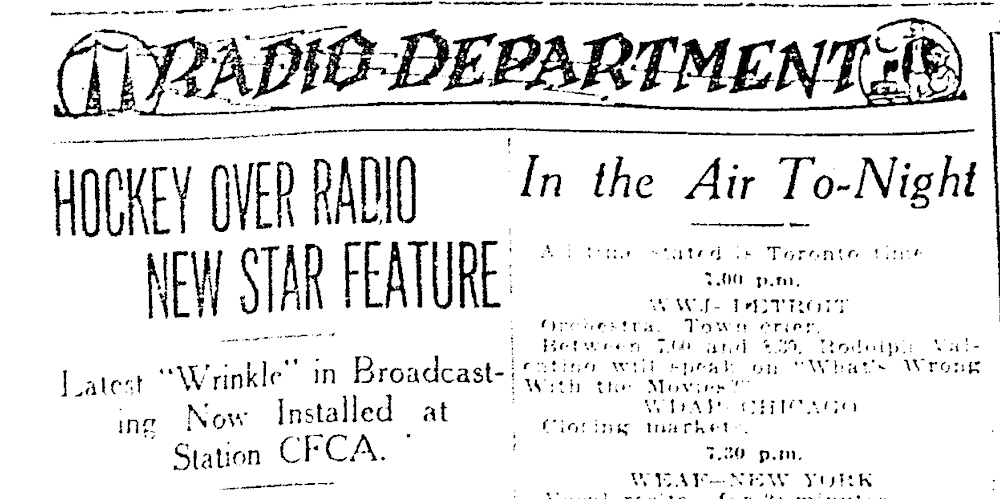
CFCA was on the air again for the third period of every big game from the Mutual Street Arena until the end of the hockey season, but Norman Albert is only known to have broadcast one more game that year. On February 16, 1923, Foster Hewitt called his first game, a 3-3 tie between the Toronto Argonauts (yes!) and the Kitchener Greenshirts. Hewitt very quickly became a hockey broadcasting legend. His domination of this new field pushed Albert out of the spotlight, and Albert’s pioneering efforts would soon be all but forgotten.
Foster Hewitt must have known that Norman Albert preceded him, but over the years he did very little to dissuade people from believing that he had been the first. However, in his 1967 autobiography, Foster Hewitt: In His Own Words, Hewitt would recall the date of his first broadcast as March 22, 1923. (Other stories, over the years, would list the date as March 23, 1923.) But March 22, 1923, was actually the date of the last of many hockey broadcasts Hewitt made that season. His confusion over the dates would lead to another misconception over early broadcasts … and eventually bring Albert’s name back into the picture.
On March 14, 1923, radio station CKCK, owned by the Regina Leader newspaper, aired a playoff game between the Regina Capitals and Edmonton Eskimos of the Western Canada Hockey League, then a Stanley Cup rival of the NHL and the Pacific Coast Hockey Association. The man who called the game that night was Lionel Dyke “Pete” Parker. There were many in Western Canada who recalled Parker’s game and as the date of March 22, 1923 for Hewitt’s initial broadcast came into vogue, there were those who believed that Parker’s performance must have been first.
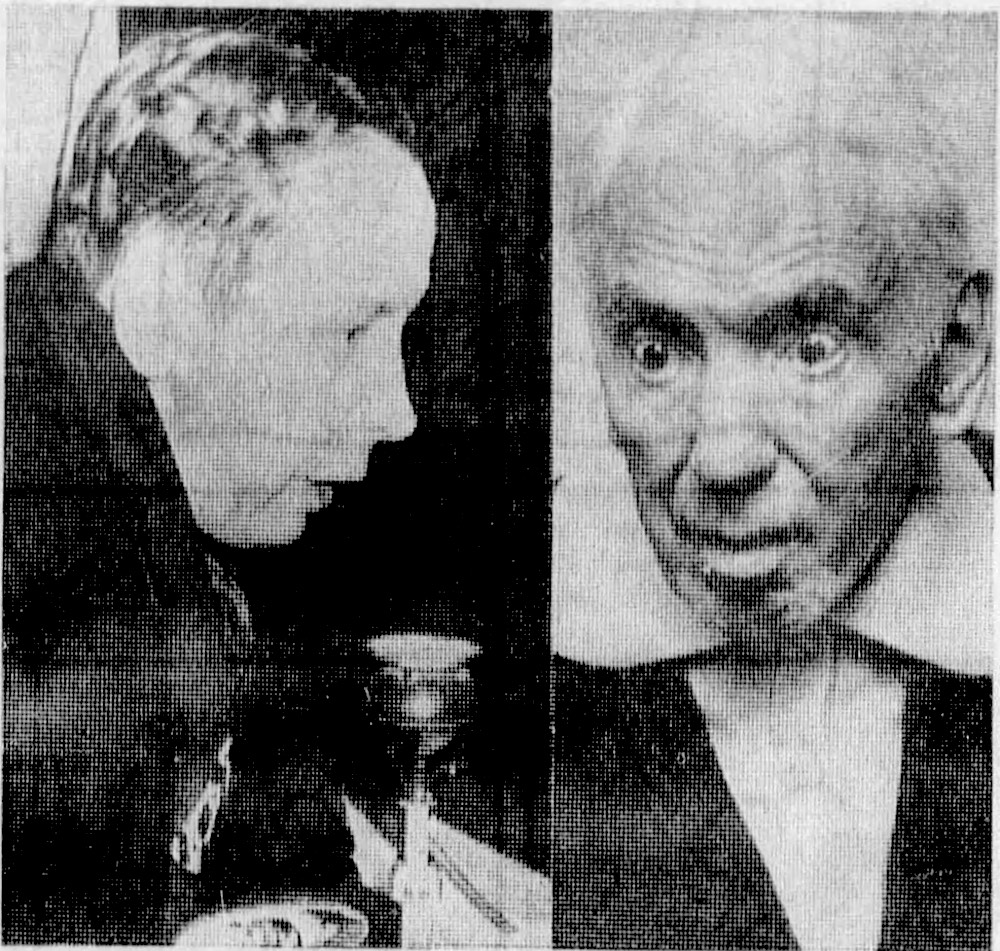
Bruce Levett’s story when it appeared in the Red Deer Advocate on June 28, 1972.
Among those most strongly in Parker’s corner was Tom Melville, whose family had moved from Scotland to Weyburn, Saskatchewan, in 1910 when Melville was only two years old. He may well have heard Parker’s first broadcast. He’d certainly heard of it. Melville would work for Regina newspapers from 1933 until 1998, and he made Parker’s case to hockey authorities in the late 1960s.
Writing in the Regina Sun on December 5, 1993, Melville recalled, “[i]n the late 1960s an eastern company used television to promote a series of phonograph records dealing with Canadiana. Frank Selke Jr. did the TV commercial. Among his statements was one that people could listen to an excerpt from a hockey game played in Maple Leaf Gardens as broadcast by Foster Hewitt ‘the first-ever hockey broadcaster.’”
Melville writes that he “had been fighting for a long time to get recognition for Parker, who was living in retirement in Kelowna.” Melville wrote to Selke and told him he was wrong. Selke told Melville he was surprised to learn that Hewitt was not number one and promised to look into it. Selke — probably by looking through old issues of the Toronto Star, as I did in 2004 when all this first came to my attention — discovered the February 8, 1923, broadcast by Norman Albert.
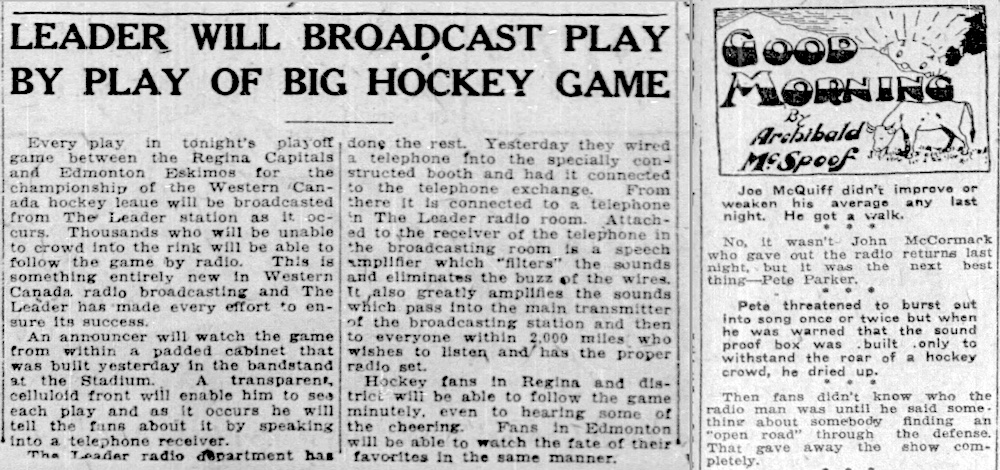
Though he doesn’t say so, Melville was also likely surprised to learn of Albert, and relayed the information to Parker in Kelowna. “Getting information from the telephone office in Toronto, [Parker] came up with a number for Norman Albert and called him.”
Albert told Parker that he had, indeed, broadcast the third period of a game that night as an experiment for the radio station owned by the Toronto Star, the paper for which he worked … and where Foster’s father, William A. Hewitt, was the sports editor.
Perhaps this all happened a little bit later than Melville recalled. Or maybe it just took a while for the story to emerge, since it’s not until 1972 that Norman Albert appears to have finally gotten his due. Bruce Levett, sports editor for Canadian Press, spoke to both Albert and Hewitt for a story that appeared in many newspapers across Canada in late June of that year.
“Who broadcast the first radio account of a hockey game?” wrote Levett. “Tradition says it was Foster Hewitt on March 23, 1923: files seem to indicate it was Norm Albert on Feb. 8, 1923. But neither of the pioneer broadcasters knows for certain.”
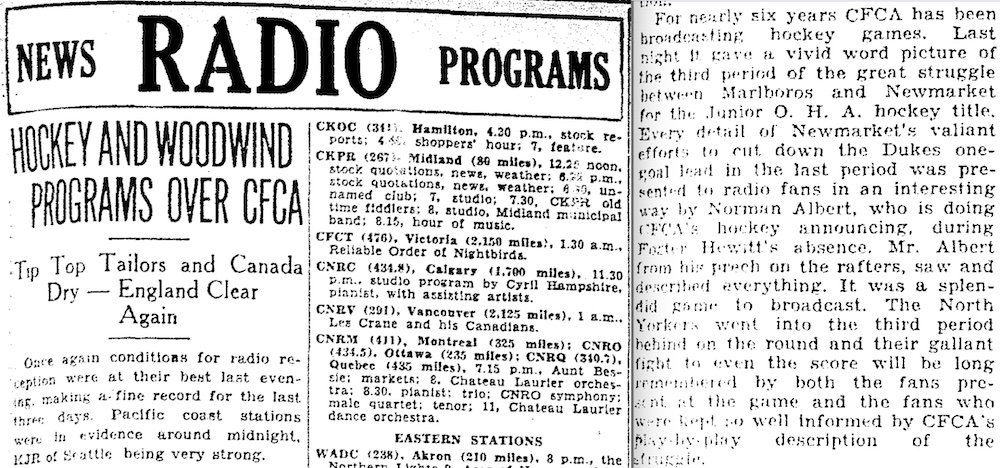
Albert was filling in on the air for Foster Hewitt.
“People are always telling me I was the first, but I’ve never claimed that, Hewitt says. But then, I never argued the point.”
Hewitt may not have come clean, but the rest of Levett’s story makes it pretty clear that Albert knew the truth! “If that game (Feb. 8) was the first,” he told Levett, “then I guess I was the first.”
In Albert’s recollection, CFCA manager William Main Johnson had actually asked Hewitt’s father to make the first broadcast. “Bill couldn’t do it,” Albert remembered, “and looked around for son Foster, who was out on another assignment. He offered the job to the late Lou Marsh, who turned it down. There was nobody else available, so Main Johnson asked me. I had been doing a lot of sports reporting and had a loud, clear voice.”
As Albert remembered it, he broadcast the game from “a little hut about the size of a coffee table” beside the penalty timekeeper’s bench. “I sat bent over and we broke in halfway through the game, somewhere in the second period. [The broadcast definitely began with the third period.] I think we followed the Hambourg Trio, I seem to recall a bass drum and a violin.” The Star’s radio listings from February 8, 1923 do show a Concert program from 8 to 9 p.m. that night, but no act called the Hambourg Trio.

Albert, who had left the Star for the Toronto Telegram in 1927, and then got out of the newspaper business in 1950 to work with an investment firm, was, said Levett, philosophical about it all. “If I had stayed with the Star, I might have laid claim to being first – but what’s the point now? [Still] if anyone doesn’t believe you when you write this, send them to me. I’ll straighten them out.”
And so, Norman Albert briefly returned to the limelight, only to pretty much disappear again after he died on Christmas Day in 1974. But still, the story of hockey on the radio was being told wrong. This was because no one had yet discovered that Foster Hewitt’s first broadcast was actually on February 16, 1923, nor Albert’s pioneering NHL broadcast of February 14, nor the other early broadcasts in Toronto. Bill Fitsell may have been the first to report on these, in the Kingston Whig-Standard on November 23, 1985, when Bill took Scott Young to task for his lazy research in Young’s Hewitt bio Hello Canada! Yet, I think that until I wrote about all this for the Society of International Hockey Research in 2004, anyone telling the story still believed that Albert was hockey’s first broadcaster, Pete Parker the second, and Hewitt third … even though Hewitt had actually been on the air before Parker by nearly a month.
In Parker’s first broadcast on March 14, 1923, he was on the air for the full 60 minutes, so regardless of whether he’d been first, second, or third, his supporters now claimed that he was the first man to broadcast an entire hockey game. But that’s not true either. On February 22, 1923, radio station CJCG in Winnipeg, owned and operated by the Manitoba Free Press, aired the complete game as the Winnipeg Falcons defeated the Port Arthur Hockey Club 4-1. It seems that none of the stations in Toronto, Winnipeg, or Regina had been aware of what the others were doing. The name of the Winnipeg broadcaster seems never to have been reported.
Foster Hewitt, of course, would go on to call thousands of games, on radio and television, before ending his broadcasting career with the 1972 Canada-Russia series. In addition to the two other games Norman Albert was known to have called in 1923, he also returned to the air for a few games during Hewitt’s absence from the CFCA booth in March of 1928. (Albert had left the Star by then, but was refereeing OHA games. Hewitt was in Europe, with his father and the Varsity Grads, during and after the 1928 Winter Olympics.)
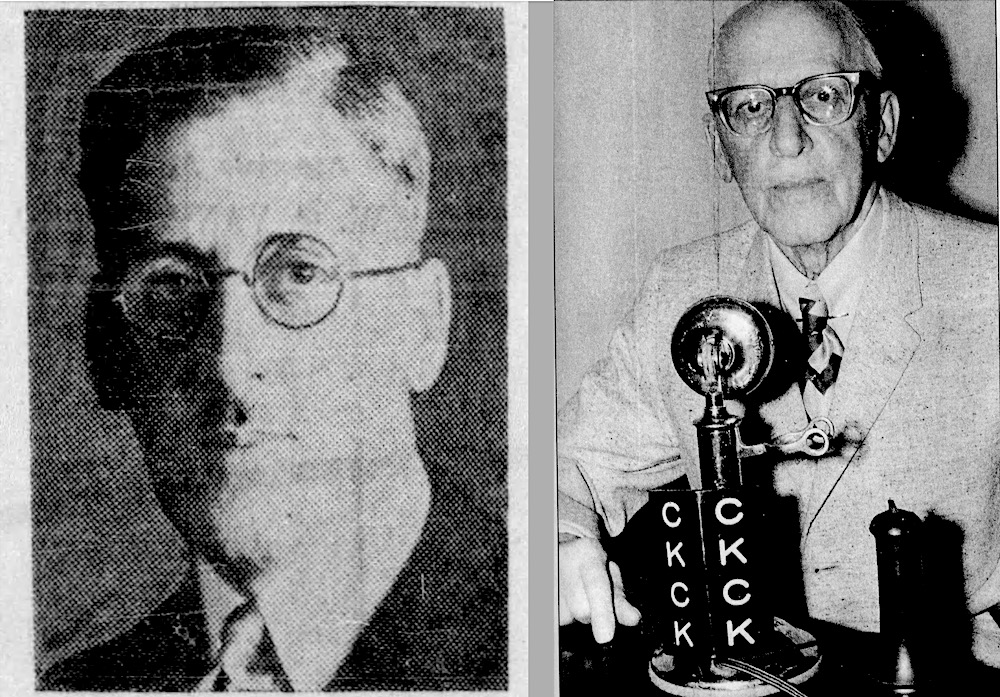
As for Pete Parker, his was the first complete broadcast of a professional hockey game. He called more games during the winter of 1923-24 (six more, according to a Leader-Post story from March 31, 1991), but apparently none beyond that. He seems to have been out of radio entirely by the 1930s and when he passed away in Kelowna on February 11, 1991, Parker’s obituary in the Leader-Post said nothing at all about his radio career.
On September 13, 1997, on the 75th anniversary of CKCK, the Regina Leader-Post ran a transcription of an interview taped in 1962, with the station’s first (and long-time) employee, Bert Cooper. In his interview, Cooper spoke of Parker and their first hockey broadcast. It was a nurse in a sanitorium in Fort Qu’appelle who suggested hockey on the radio as something her patients would enjoy. Cooper got permission from the owner of the Regina Capitals, who said he would go along with it … as long as they didn’t announce it ahead of time. He didn’t want to cut into potential ticket sales.
“I told Pete Parker, assistant to the manager of the Leader-Post. He was quite a sports fan, and he was a baritone singer. He had a deep low voice, an excellent voice, and he loved hockey, and he knew hockey. We built a booth at the south end of the rink…. That night I announced, “We’re now switching you to Studio No. 2, where you’ll hear the voice of Pete Parker, our new announcer. I gave Pete the cue, and he went ahead, and you could hear the hockey sticks, and the crowd, as plain as can be.
“Pete Parker was a minister’s son. One of the Edmonton Eskimos came down the ice with the puck, and time and time again, he couldn’t get it in the net. And he swore. Pete Parker had the window open, and he shouted down to the player, ‘Cut it out, we’re broadcasting!’”
Good stuff Eric…another fascinating story. Thanks for sharing this cool part of hockey broadcasting.
Magnificent research by Eric, the very best in the business. Coincidentally in my Monday Hockey News column, I ran in interview with Kenny Albert who does play by play for TNT’s NHL games. A rarity, Kenny’s dad, Marv, and Uncles Al and Steve, all did NHL play by play. As for Foster Hewitt, very interesting to know he was not “first.” But even in Brooklyn, I could pick up Hewitt on CBL Toronto and he instantly made a fan out of me. To this day, I’d take the Foster of the late 1940’s over any play by play guy with Doug Smith (CBM) who did a wonderful Habs job pre the great Danny Gallivan. P.S. there was a WMSG back when the old Garden opened in 1925. First Rangers play by play I heard was Bert Lee (WHN) in mid 1940s. THANKS, ERIC.
Bert Lee used to have a program with Marty Glickman (who I remember as the voice of my Jets, though that was at the tail end of Glickmans remarkable life and career) and Ward Wilson in the 50s in NY.
I’ve always wanted to find out if there are tapes of that preserved anywhere but I don’t think any have turned up unfortunately.
As a kid the only hockey was Foster Hewitt. He made even dull games seem exciting. When TV came the CBC would join the game late in the second period. In fuzzy black and white with snow. Sometimes, even though there was a “delay” we’d turn on the TV with no sound and Hewitt on radio. Even now, when in the car, radio brings hockey. Outcome still the same….Leafs don’t get the Cup.
Interesting the the western reporter was Peter Parker. He was also Spider-Man!?
I can still hear the Hewitt repeated shout “Henderson!” In 1972 as, against the rules, a radio transmitted game 8. From USSR to the staff in North York Parks and Recreation.
I had just come back from a community meeting in the Bridle Path, no radio on in my car, entered the office and heard the excited Foster Hewitt.
The best hockey line was from Big Bobby Clobber (on “Air Farce” Dave Broadfoot) when the “hockey star” was asked would Hamilton get a hockey team? “No, Big Jim, then Toronto would want one too!”
Brilliant research and writing, Eric.
Thanks, Eric! Your research and sleuthing skills are second to none. Great yarn about hockey on the air!
Radio sports announcing is another great art. I loved listening to games on the Radio.
Thanks Eric. Cool Piece
Great research! Interesting read. Thanks!
Great story! Here I thought Foster Hewitt was the pioneer.
Thank you, Eric. Another fine piece. I was reminded as I read it that we ‘remember’ what we want to believe about history (ie: Foster was first, Montreal bought a league to turn Beliveau pro, Bowman has a steel plate in his head) and it is so good to have someone such as yourself take the time to deal us a hand of facts and reality. Keep you the great work.